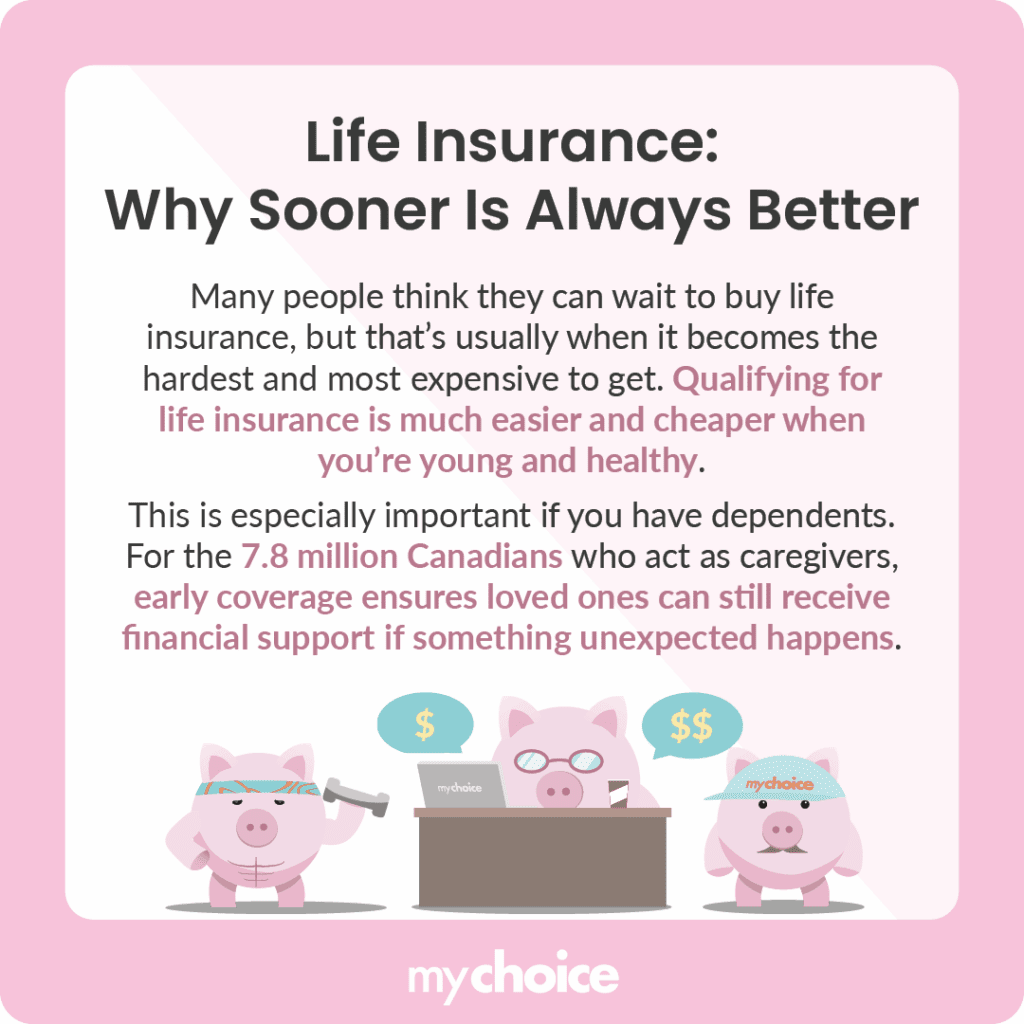If you’re young and healthy, life insurance is probably far below in your list of priorities. You’re still in good health, and you might not have dependents yet, so there’s no one to leave money to. However, nobody knows what’s going to happen in the future, and life insurance can be a great way to protect yourself from life’s uncertainties.
The Misconception: “I’ll Buy Life Insurance When I Need It”
One of the most common excuses people say when stalling their life insurance purchase is “I’ll buy it when I need it.” Unfortunately, the time when you need life insurance is usually the time when qualifying for it is difficult or incredibly costly. Qualifying for life insurance as a young, healthy person with few health issues is easier and more affordable than qualifying as an older person with more health issues. Early qualification for life insurance is even more important if you have dependents, like the 7.8 million Canadians who are caregivers. While you’re still able to provide for them now, insurance is essential because even if you pass away unexpectedly, your dependent can receive your insurance payout and continue getting the care they need.

The Real Cost of Waiting
One big reason not to procrastinate on life insurance is locking in lower premiums and better policy terms. Nobody knows what awaits them in the future, and even if you’re young and healthy now, there’s no guarantee it’ll stay that way. If you delay getting life insurance, you may land higher premiums, limited coverage, and have difficulties passing the underwriting process.
What Life Insurance Actually Protects
Most people think getting life insurance means leaving money to the loved ones you leave behind. While that’s true, life insurance is also about protecting everything you’ve built throughout your life. Let’s take a look at how life insurance protects you in multiple aspects of life:
| Protection Type | What It Covers | Why It Matters Early |
|---|---|---|
| Debt protection | Protects your loved ones from being saddled with outstanding debts left before your passing. | Ensuring your loved ones can repay your debt even if you pass away before paying it off. |
| Business protection | Provides your business partner a cash payout if you pass away, helping them cover costs while they look for your replacement. | Ensuring your business partner can continue the business in your absence. |
| Health protection | Some life insurance policies offer health-related coverage as add-ons or as part of your main policy. | Receiving coverage in case you’re diagnosed with terminal, critical, or chronic illnesses. |
| Legacy building | Leaving an inheritance for your loved ones, usually done with cash value life insurance products like whole life insurance. | Building your cash value or investments to ensure your loved ones get a healthy windfall when you pass away. |
Life Insurance is a Financial Tool, Not a Final Expense
Another common misconception is that life insurance isn’t useful for you, the policyholder, during your lifetime. However, that’s a misconception for a reason because you can benefit from life insurance while you’re alive.
The most common use of life insurance as a financial tool is through its cash value. With some types of insurance, you get a cash value component that will grow as you pay premiums. You can withdraw or loan against this cash value to benefit from your investments while you’re alive.
Term life insurance is a bit more limited in its use during your lifetime, since you can mostly only make use of its accelerated death benefit if you’re diagnosed with a terminal illness. With a LIMRA report stating that 31% of Canadians are concerned about being able to support themselves if they couldn’t work due to a disabling illness, getting accelerated death benefits could be a potential answer.
Key Advice from MyChoice
- If you’re a caregiver, consider getting life insurance while you’re young to improve your chances of qualifying.
- Choose whole life insurance or universal life insurance if you want to invest with your insurance money.
- Get life insurance if you’re worried about suddenly passing away and leaving your business partner to pick up the pieces.








